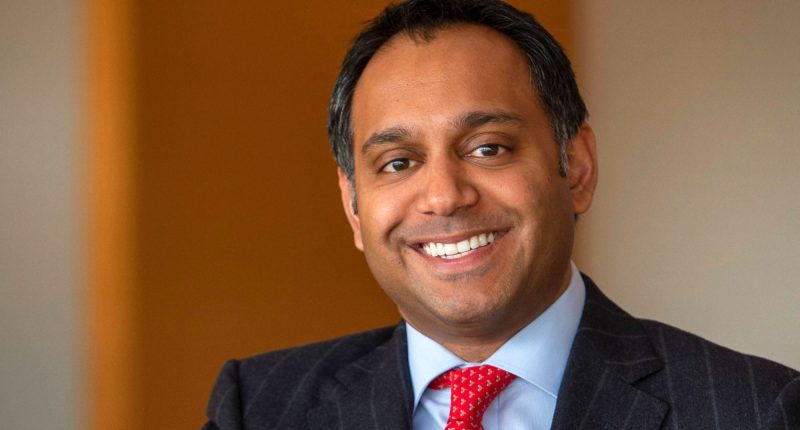
Opinions expressed by Entrepreneur contributors are their own.
You’re reading Entrepreneur India, an international franchise of Entrepreneur Media.
India entered the jet age on the wings of Boeing commercial jetliners. The camaraderie dates back to 1932, when J.R.D. Tata flew from Karachi to Ahmedabad via Mumbai in a single-engine de Havilland (now Boeing) Puss Moth. In a span of more than ninety years, Boeing’s partnership with the TATA Group has further consolidated: At the 2023 Paris Air Show, Boeing and Air India inked a historic moment with a significant order marking Boeing’s largest deal in South Asia.
For Salil Gupte, heading the Indian arm of Boeing, the journey was stormy – when he moved to New Delhi from Seattle in 2019, he had to navigate two crises – grounding of Boeing 737 Max in 2019 and COVID-19 pandemic in 2020. Four years after he became president of Boeing India, the aircraft maker has eclipsed challenges and is moving towards a strong footing in the country. Today, India’s commercial aviation market is expected to become the third-largest in the world by 2041, with a fleet size nearly quadrupling compared to 2019. “The country is projected to receive over 90 per cent of South Asia’s airplane deliveries, requiring over 2,400 new aircraft, while its cargo market is set to expand significantly, with the fleet growing from 15 to 80 airplanes by 2042, driving a $135 billion demand for commercial services,” said Salil, highlighting the substantial demand in South Asia for 37,000 pilots and 38,000 maintenance technicians over the next two decades.
Catering to Make In India, domestic demand for aircraft, partnering with MSMEs, setting up an assembly plant in India, strengthening up defense ties are some of Gupte’s immediate action plans in India.
Make In India, New Investments & Partnerships
Boeing leads among foreign OEMs, with over $1 billion in annual manufacturing and services sourced from 300-plus Indian supplier partners. Notably, 25 per cent of these partners are Micro, Small, and Medium Enterprises (MSMEs) integral to its global supply chain. Boeing’s joint venture with Tata Advanced Systems Ltd. (TASL), Tata Boeing Aerospace Limited (TBAL) in Hyderabad, is a state-of-the-art facility that showcases Make in India and Aatmanirbhar Bharat. TBAL manufactures aero-structures of Boeing’s AH-64 Apache helicopter for consumers (including the US Army), involving fuselages, which is a long hollow tube which holds all the pieces of an airplane together; the secondary structures (non primary load carrying members) and vertical spar boxes which are main structural member of the wing. “More than 230 fuselages have been delivered by TBAL, with over 90 per cent of the parts used manufactured in India, sourced from over 100 MSME suppliers. Earlier in 2023, TBAL completed delivery of the first fuselage for the Indian Army’s six AH-64 Apache attack helicopters and shipped the first vertical fin structure for the Boeing 737 aircraft,” Gupte explained.
Boeing has partnered with GMR Aero Technic to establish a Boeing Converted Freighter line in Hyderabad, while also establishing a Global Support Center in Gurgaon to provide customized operational efficiency and safety improvement projects for airline customers, regulatory bodies, and other stakeholders. Additionally, Boeing is investing in a new India Logistics Center to provide efficient and cost-effective service solutions to regional customers, ensuring higher fleet utilization. Boeing recently announced a $100 million investment in infrastructure and programs to train pilots in India, which will support India’s need for new pilots over the next 20 years. Furthermore, Boeing has invested $200 million in establishing a state-of-the-art, 43-acre, wholly-owned engineering and technology campus in Bengaluru, which is set to become Boeing’s largest facility of its kind outside the United States.
To leverage and contribute to India’s robust start-up culture, Boeing launched its third edition of the Boeing University Innovation Leadership Development (BUILD) program, which aims at encouraging university graduates and early-stage start-up entrepreneurs in India to develop ideas that can be converted into viable business offerings. “These initiatives keep the talent stimulated to be frontrunners in making air travel and its enabling infrastructure more efficient, safe, and effective for our customers. Our vision is to help support the country’s focus on transforming talent and capabilities and drive continued innovation to help strengthen the global and local aerospace and defense sectors,” he said.
Domestic Demand & Supply Chain Crisis
At the 2023 Paris Air Show, Boeing and Air India signed a historic order deal encompassing 190 737 MAXs, 20 787 Dreamliners and 10 777X jets, with options for an additional 50 737 MAXs and 20 787 Dreamliners. On another front, Akasa Air stands out as one of the fastest-growing startups in aviation history. “We recently delivered Asia’s inaugural 737-8-200 to Akasa, marking the 20th aircraft in their fleet. Akasa’s growth journey has taken them from startup operations to 20 aircraft in just a year, all powered by the fuel-efficient 737 MAX. With the addition of four more aircraft during the Paris Air Show 2023, their order book now comprises 76 jets, including 23 737-8s and 53 high-capacity 737-8-200 airplanes,” Salil explained.
Supply chain disruption is a global issue across all industries, Boeing is regularly monitoring suppliers across the globe, including sub-tier supply chain, to ensure deliveries support its current and future airplane production needs. This includes a variety of approaches, from leadership engagements to daily communications to onsite and embedded teams, all ensuring alignment and stable, predictable execution. “We’ve also ramped up internal fabrication for surge capacity and we’ve increased inventory of select parts for risk protection. Boeing leaders are working with senior executives across the supply chain to identify strategies, best practices and opportunities that will drive first-pass quality, enhance predictability and enable stability throughout the industry. There’s progress in many areas of the supply base, however, we expect supply chain challenges to continue into the near future as we work through on a case-by-case basis,” he explained.
Growing Defense Opportunities
Boeing is working with the Indian Air Force (IAF) and the Indian Navy (IN) to provide operational capability and readiness for the P-8Is, the C-17s, the Head of State aircraft and the Chinooks and Apaches. It supports the IAF’s C-17 fleet under the Globemaster Integrated Support Program (GISP) that maintains high mission capability rates by providing them access to an extensive support network for parts availability and economies of scale. Boeing offers long-term Performance Based Logistics (PBL) solutions which have a proven track record of transforming the legacy transactional support between Boeing and its customers, to solutions that increase aircraft availability, resolves Aircraft On-Ground (AOG) situations, and reduces the life-cycle cost of operating defense aircraft.
“We had set up Boeing Defence India (BDI) with an aim to provide holistic lifecycle solutions for defense customers in India. Cost-effective solutions, timely support, and flawless execution are critical elements of BDI’s commitment to the market and our customers. A PBL strategy will help resolve operational issues and enable further growth of Aatmanirbhar Bharat, strengthening India’s national defense industry,” Salil added.
Boeing’s substantial infrastructure investments aimed at bolstering the mission readiness of the Indian armed forces are exemplified by the C-17 MRO and training facility at Hindon and the comprehensive P-8I training facility at Rajali. India’s civil aviation market is poised for remarkable growth, with expectations of over 2,700 aircraft arriving in the country over the next two decades. To align with this expansion, India requires robust Maintenance, Repair, and Overhaul (MRO) services to minimize the current outflow of MRO spending.
“While there’s a noticeable gap in component and engine maintenance within India’s MRO industry, Boeing is committed to swiftly addressing this demand and supporting its Indian customers. In terms of base maintenance, Boeing plans to leverage defense MRO and complex civil aircraft modification work to develop infrastructure and capabilities applicable to civil MRO as well. This strategy will enhance the overall MRO capabilities in India. For component and engine maintenance, Boeing encourages its suppliers to collaborate with local Indian MROs when component original equipment manufacturers (OEMs) reach capacity at their overseas facilities,” Gupte explained.
Boeing is facilitating partnerships between foreign MROs that hold exclusive intellectual property rights to component repair and Indian MROs. This collaboration aims to elevate the overall MRO capabilities in India, contributing to the country’s growing prominence in the global aviation industry.
This article is from Entrepreneur.com








